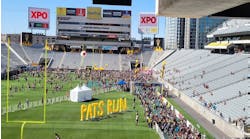Self-driving technology venture TuSimple Holdings will lay off a fourth of its roughly 1,400 workers—most of them in the U.S.—as part of a restructuring plan its on-his-second-stint CEO says will focus more sharply on commercializing its newest technologies.
Cutting 350 positions will cost San Diego-based TuSimple between $10 million and $11 million in restructuring costs, officials said Dec. 21, but save it about $60 million annually. President and CEO Cheng Lu and his team also are exploring options, including a sale, for TuSimple’s Asia division.
Of the roughly 1,100 workers who will remain post-layoffs, roughly 80% will be in research and development roles. They will look to commercialize the company’s autonomous driving technology while it retreats from some of its current freight operations, particularly those using existing software “that provides limited value” to TuSimple’s tech development.
Lu, who also led the company from September 2020 until this past March, pointed both to TuSimple’s need to stash cash where it can and to the trucking industry’s readiness today (or relative lack thereof) to adopt autonomous tech as reasons for the drastic cuts.
See also: Fleets begin to get a feel for the future of moving freight
“We must be prudent with our capital and operate as efficiently as possible,” Lu said. “This is part of our overall strategy to prioritize investments that bring the most value to shareholders and position TuSimple as a customer-focused, product-driven organization.”
TuSimple’s cost cuts come on the heels of several major changes in its leadership ranks. In addition to Lu’s return a month ago, the company’s also has made interim CFO Eric Tapia’s role permanent and revamped its board with three additions and a new committee structure. In addition, the company and truck manufacturer Navistar pulled the plug on a partnership that had targeted 2024 for the introduction of Level 4 self-driving Class 8 tractors.
Shares of TuSimple (Ticker: TSP) fell nearly 6% in regular trading Dec. 21 but rose slightly to $1.44 after hours on word of the restructuring plan. Over the past six months, however, they have lost more than 80% of their value, slashing the company’s market capitalization to about $320 million.




